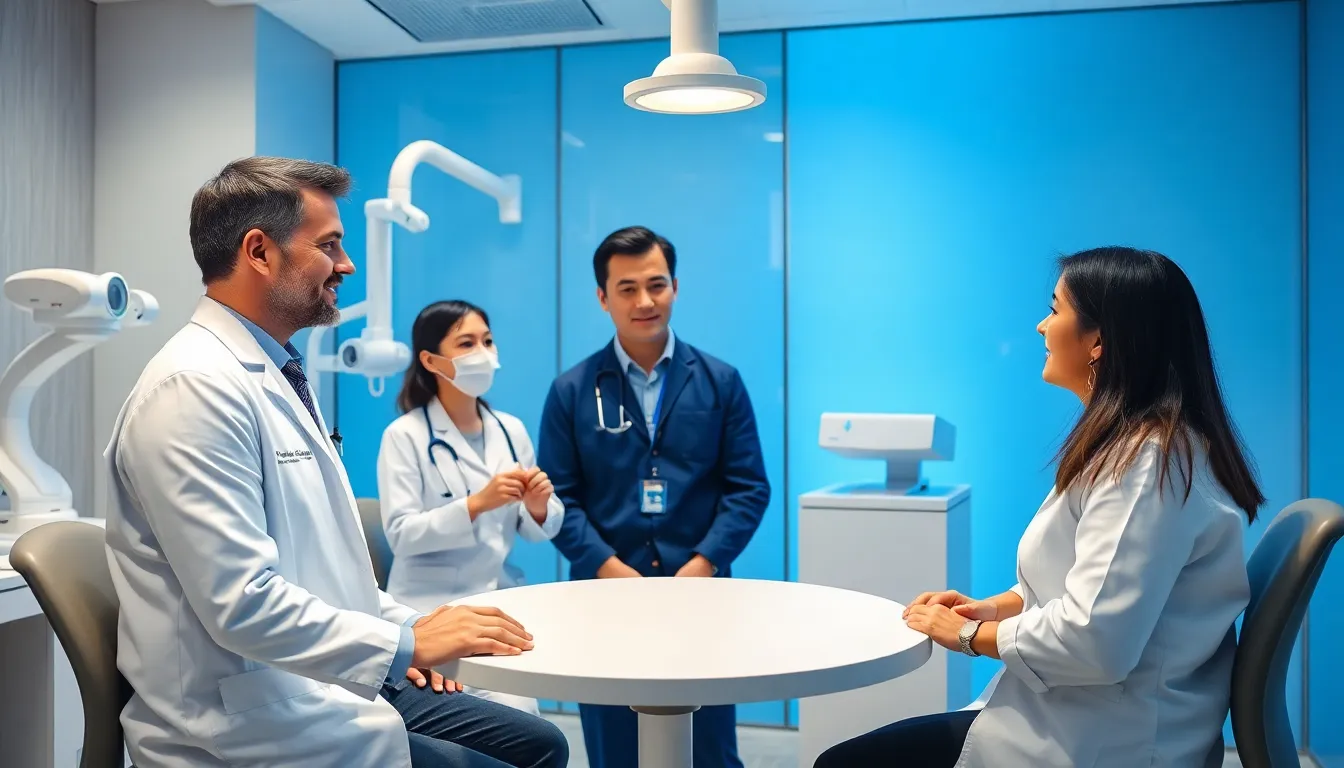
Key Takeaways
- Tinnitus is a common condition in Melbourne, often linked to noise exposure, ageing, or hearing loss, and can significantly impact daily life.
- A wide range of treatment options is available in Melbourne, including medical therapies, sound therapy, hearing aids, and holistic strategies tailored to individual needs.
- Multidisciplinary care—featuring audiologists, ENT specialists, and psychologists—is key for comprehensive tinnitus management and improved patient outcomes.
- Personalised management plans and evidence-based therapies like CBT, tinnitus retraining therapy, and relaxation techniques help reduce symptoms and distress.
- Patient success stories from Melbourne clinics highlight significant improvement in quality of life through coordinated, ongoing care and support.
- Adopting daily management tips—such as noise protection, using sound enrichers, practising relaxation, and maintaining professional follow-up—can further alleviate tinnitus symptoms.
Tinnitus treatment in Melbourne offers comprehensive solutions through multidisciplinary care combining audiologists, ENT specialists, and psychologists for personalised management plans. Treatment options include medical therapies, sound therapy, hearing aids, cognitive behavioural therapy (CBT), tinnitus retraining therapy (TRT), and holistic strategies tailored to individual needs and symptoms. Evidence-based approaches help reduce tinnitus-related distress, improve sleep quality, and restore daily functioning through coordinated care and ongoing support. For innovative neurological treatments addressing tinnitus and related conditions, tms treatment provides non-invasive Transcranial Magnetic Stimulation therapy alongside other neuromodulation approaches, offering drug-free alternatives for patients seeking relief from persistent auditory symptoms and associated mental health challenges.
Understanding Tinnitus: Causes and Symptoms
Tinnitus describes a perception of sound, often ringing, buzzing, or hissing, without an external source. Most cases in Melbourne relate to sensorineural hearing loss caused by long-term noise exposure in workplaces, live music venues, or city traffic. Otolaryngology research highlights that ototoxic medications, head injuries, and ear infections also contribute to tinnitus onset. Ageing results in gradual auditory nerve changes, making tinnitus common in those over 60.
Symptoms include persistent noises that no one else can hear. These sounds may be constant or fluctuate. People in Melbourne commonly report that tinnitus disrupts sleep and concentration. Some experience increased sensitivity to everyday sounds, known as hyperacusis. Emotional distress, including anxiety and irritability, often follows disturbed sleep or persistent symptoms.
A 2023 Australian Hearing Report found that more than 9% of adults in metropolitan regions, including Melbourne, experience ongoing tinnitus. Early identification of symptoms and causes supports targeted management options.
Tinnitus Treatment Options Available in Melbourne
Tinnitus care in Melbourne combines medical, technological, and holistic strategies tailored for each patient. Specialist clinics design management plans using the latest techniques.
Medical Approaches and Therapies
Medical tinnitus management in Melbourne starts with a comprehensive audiological assessment. Audiologists from clinics like Melbourne Audiology Centre design personalised plans targeting neurophysiological triggers. Cognitive behavioural therapy (CBT) helps reduce tinnitus-related stress, while counselling improves coping skills. Tinnitus retraining therapy (TRT) merges sound therapy and counselling, guiding the brain to filter out tinnitus sounds. ENT specialists collaborate when medical or surgical intervention is required. Medications treat anxiety, sleep disturbances, or underlying conditions but don’t cure tinnitus. Data from the Australian Hearing Report (2023) support regular follow-ups for effective symptom control.
Sound Therapy and Hearing Aids
Sound therapy in Melbourne uses external noise to reduce tinnitus awareness. Maskers, sound generators, and white noise devices are commonly applied. Hearing aids, ideal for those with hearing loss, amplify external sounds and mask tinnitus. Severe hearing loss may require cochlear implants, which can also suppress tinnitus sensations. Programmes such as Listening And Communication Enhancement (LACE) retrain the brain’s response to sound and are offered at reputable centres including Abi Hearing and Victorian Hearing. Audiologists monitor progress and adjust device settings for optimal benefit.
Complementary and Alternative Treatments
Complementary care in Melbourne emphasises lifestyle modification and stress management. Clinics integrate relaxation techniques, mindfulness, and advice on sleep improvement to lessen tinnitus impact. Counsellors guide patients through mental health support for anxiety and irritability. Some practices provide nutritional advice and recommend gentle exercises. Close partnership with general practitioners and mental health professionals ensures all aspects of well-being are addressed, with ongoing review to refine strategies. Victorian Hearing and similar providers promote a holistic model, offering patients multiple avenues to achieve daily comfort.
Choosing the Right Tinnitus Specialist in Melbourne

Selecting a tinnitus specialist in Melbourne means prioritising experience, comprehensive assessment, and tailored support. Clinics integrate audiologists, ENT specialists, and psychologists to design management plans based on individual symptoms and needs.
What to Look for in a Treatment Provider
- Multidisciplinary teams deliver coordinated care, combining audiologists, ENT doctors, and psychologists.
- Clinics like Melbourne Hearing Care Clinic and Victorian Hearing provide thorough diagnostic evaluations including hearing tests and tinnitus-specific assessments.
- Providers use evidence-based therapies such as hearing aids for sensorineural hearing loss, sound therapy, cognitive behavioural therapy (CBT), tinnitus retraining therapy (TRT), and relaxation techniques.
- Teams offer personalised plans, adjusting strategies based on tinnitus severity and lifestyle factors—for example, noisy workplaces or music venues.
- Specialists maintain clear communication, educating patients about tinnitus causes, symptom patterns, and realistic expectations for management.
Questions to Ask During Your Consultation
- What specific diagnostic tests will you use to assess my tinnitus severity and type?
- Which therapies do you recommend for my symptoms—sound therapy, hearing aids, or CBT—and on what evidence?
- How soon should I expect noticeable improvements based on my individual case and the chosen treatment plan?
- What lifestyle or self-care changes might support better outcomes?
- How will you routinely evaluate progress and modify the plan if symptoms persist or change?
- Do your services include access to psychological support for tinnitus-related anxiety or distress?
- What are the costs for consultations and ongoing treatments, and can private health insurance or Medicare cover any of these options in Melbourne?
Success Stories and Patient Experiences
Melbourne tinnitus clinics report high rates of patient improvement through tailored, multidisciplinary treatment plans. Mini Gupta’s clinic highlights severe cases like Mr Damian Duke, who developed significant tinnitus after surgery. Retraining therapy and CBT at the clinic helped him regain normal daily activity; Gupta notes that about 60% of her patients show suicidal thoughts at first, with most achieving substantial relief after intervention.
Sound Relief Hearing Center and Treble Health document further positive responses among Melbourne and international telehealth patients. People using sound therapy with hearing aids, plus holistic coaching and structured relaxation like meditation or yoga, frequently confirm better sleep, lower anxiety, and long-term tinnitus habituation. Clinicians observe these functional changes in follow-up sessions.
Emerging treatments such as the Lenire device, which combines sound therapy with neurological stimulation, show 84% of participants in global trials achieving symptom improvement. Laser therapy features in select Melbourne case studies, reporting reductions in tinnitus intensity, but its clinical research base locally remains limited.
Consistent themes in patient experience include rapid reduction in distress, gradual improvement in concentration, and increased confidence to resume work or social engagement. Multidisciplinary support, clinical monitoring, and coordinated therapy selection drive most successful outcomes in Melbourne tinnitus care.
Tips for Managing Tinnitus in Daily Life
Taking practical steps each day makes tinnitus less intrusive.
- Minimise exposure to loud environments in Melbourne, including live music venues, city traffic, and construction zones, as excessive noise can worsen tinnitus symptoms.
- Limit focused listening to tinnitus sounds, since constant monitoring increases awareness and distress, according to St Vincent’s Tinnitus Clinic.
- Maintain regular use of sound enrichment tools, including white noise machines, smartphone apps, and background music, which help mask tinnitus for many individuals.
- Practise daily relaxation techniques, such as meditation or slow breathing exercises, with clinics like Victorian Hearing recommending stress reduction to lower tinnitus intensity.
- Engage in pleasant activities like walking in parks or socialising, as positive mood changes reduce sensitivity to ringing or buzzing sensations.
- Follow tailored guidance from multidisciplinary teams, including audiologists and psychologists, who set individual strategies based on needs, as outlined in Melbourne tinnitus management protocols.
- Scrutinise medication changes and health status by keeping a log of possible tinnitus triggers, especially after illness or medication updates.
Table: Daily Tinnitus Management Strategies
| Strategy | Contextual Example | Evidence Source |
|---|---|---|
| Avoid loud noise | Melbourne trams and concerts | Victorian Hearing, 2023 |
| Use sound enrichment | White noise app at home | St Vincent’s Tinnitus Clinic |
| Practise relaxation | Guided meditation session | Clinic Patient Education |
| Stay active socially | Attend local group activity | Patient Experience Reports |
| Seek professional input | Audiologist consultation | Management Programmes |
Combining these approaches supports stronger coping and improves daily quality of life for people with tinnitus in Melbourne.
About Neuralia TMS
Neuralia TMS, located in Moonee Ponds, VIC, is a leading provider of non-invasive, drug-free treatments for mental health and neurological conditions.
Under the leadership of Medical Director Dr. Shanek Wick, Neuralia TMS specialises in Transcranial Magnetic Stimulation (TMS) therapy, which is used to treat conditions such as depression, anxiety, PTSD, OCD, chronic pain, and Parkinson’s disease. In addition, the clinic offers Transcranial Direct Current Stimulation (tDCS), an at-home neuromodulation therapy, as well as pharmacogenetic testing to personalise treatments based on each patient’s unique genetic profile.
Contact:
Dr. Shanek Wick, Medical Director
Phone: 03 9122 5246
Email: [email protected]
Website: www.neuralia.com.au
Location:
Suite 102/149-155 Pascoe Vale Rd, Moone Ponds 3039 VIC
Frequently Asked Questions
What is tinnitus?
Tinnitus is a condition where you hear persistent ringing, buzzing, or other noises in your ears or head that are not caused by external sounds. It can be constant or come and go, and is often linked to hearing loss or noise exposure.
What causes tinnitus in Melbourne residents?
Common causes include long-term exposure to loud noise (such as from work environments or live music), sensorineural hearing loss, certain medications, head injuries, ear infections, and ageing. Busy city life in Melbourne can increase the risk due to regular noise exposure.
Can tinnitus be cured?
There is currently no definitive cure for tinnitus, but there are many effective ways to manage and reduce symptoms. Treatments provided by Melbourne audiology clinics often lead to significant improvement in quality of life.
What treatment options are available for tinnitus in Melbourne?
Treatments include sound therapy, hearing aids, cognitive behavioural therapy (CBT), tinnitus retraining therapy (TRT), and lifestyle changes. Many clinics provide a holistic, personalised treatment plan based on each individual’s needs.
How do I choose the right tinnitus specialist in Melbourne?
Look for specialists with experience in tinnitus management, comprehensive assessment processes, and access to a multidisciplinary team (audiologists, ENTs, and psychologists). Clinics such as Melbourne Hearing Care Clinic and Victorian Hearing are well-regarded options.
What questions should I ask at my tinnitus consultation?
Ask about the cause of your tinnitus, potential treatment options and their effectiveness, expected outcomes, costs, and whether a multidisciplinary approach will be used. Understanding your personalised plan is key to successful management.
How effective are current tinnitus treatments?
Most patients in Melbourne experience noticeable improvements with tailored therapy, reporting better sleep, reduced distress, and improved focus. While a complete cure is rare, ongoing support offers significant relief for many.
Are there any new treatments for tinnitus?
Emerging treatments like the Lenire device and laser therapy are available in some Melbourne clinics. While the Lenire device shows promise, the research on laser therapy’s effectiveness is still limited.
How can I manage tinnitus in daily life?
Minimise loud noise exposure, use white noise machines or apps for sound enrichment, practise relaxation techniques, and maintain a healthy lifestyle. Track possible triggers and follow guidance from your specialist for the best results.
Where can I find support for living with tinnitus in Melbourne?
Many Melbourne clinics offer counselling, support groups, and mental health services for tinnitus sufferers. Your audiologist can also connect you with resources and community support networks tailored to your needs.
